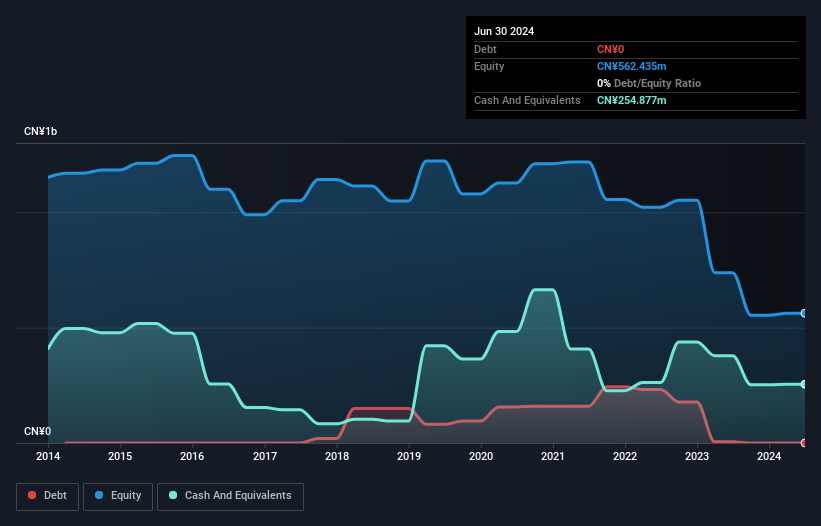Besunyen Holdings (HKG:926) Is In A Good Position To Deliver On Growth Plans

There's no doubt that money can be made by owning shares of unprofitable businesses. For example, biotech and mining exploration companies often lose money for years before finding success with a new treatment or mineral discovery. But while history lauds those rare successes, those that fail are often forgotten; who remembers Pets.com?
So should Besunyen Holdings (HKG:926) shareholders be worried about its cash burn? For the purposes of this article, cash burn is the annual rate at which an unprofitable company spends cash to fund its growth; its negative free cash flow. First, we'll determine its cash runway by comparing its cash burn with its cash reserves.
Check out our latest analysis for Besunyen Holdings
When Might Besunyen Holdings Run Out Of Money?
A company's cash runway is the amount of time it would take to burn through its cash reserves at its current cash burn rate. As at June 2024, Besunyen Holdings had cash of CN¥255m and no debt. Looking at the last year, the company burnt through CN¥70m. That means it had a cash runway of about 3.6 years as of June 2024. There's no doubt that this is a reassuringly long runway. The image below shows how its cash balance has been changing over the last few years.

Is Besunyen Holdings' Revenue Growing?
We're hesitant to extrapolate on the recent trend to assess its cash burn, because Besunyen Holdings actually had positive free cash flow last year, so operating revenue growth is probably our best bet to measure, right now. Unfortunately, the last year has been a disappointment, with operating revenue dropping 39% during the period. Of course, we've only taken a quick look at the stock's growth metrics, here. This graph of historic earnings and revenue shows how Besunyen Holdings is building its business over time.
How Easily Can Besunyen Holdings Raise Cash?
Given its problematic fall in revenue, Besunyen Holdings shareholders should consider how the company could fund its growth, if it turns out it needs more cash. Generally speaking, a listed business can raise new cash through issuing shares or taking on debt. One of the main advantages held by publicly listed companies is that they can sell shares to investors to raise cash and fund growth. By looking at a company's cash burn relative to its market capitalisation, we gain insight on how much shareholders would be diluted if the company needed to raise enough cash to cover another year's cash burn.
Since it has a market capitalisation of CN¥322m, Besunyen Holdings' CN¥70m in cash burn equates to about 22% of its market value. That's fairly notable cash burn, so if the company had to sell shares to cover the cost of another year's operations, shareholders would suffer some costly dilution.
How Risky Is Besunyen Holdings' Cash Burn Situation?
Even though its falling revenue makes us a little nervous, we are compelled to mention that we thought Besunyen Holdings' cash runway was relatively promising. Based on the factors mentioned in this article, we think its cash burn situation warrants some attention from shareholders, but we don't think they should be worried. On another note, we conducted an in-depth investigation of the company, and identified 3 warning signs for Besunyen Holdings (2 shouldn't be ignored!) that you should be aware of before investing here.
Of course Besunyen Holdings may not be the best stock to buy. So you may wish to see this free collection of companies boasting high return on equity, or this list of stocks with high insider ownership.
Valuation is complex, but we're here to simplify it.
Discover if Besunyen Holdings might be undervalued or overvalued with our detailed analysis, featuring fair value estimates, potential risks, dividends, insider trades, and its financial condition.
Access Free AnalysisHave feedback on this article? Concerned about the content? Get in touch with us directly. Alternatively, email editorial-team (at) simplywallst.com.
This article by Simply Wall St is general in nature. We provide commentary based on historical data and analyst forecasts only using an unbiased methodology and our articles are not intended to be financial advice. It does not constitute a recommendation to buy or sell any stock, and does not take account of your objectives, or your financial situation. We aim to bring you long-term focused analysis driven by fundamental data. Note that our analysis may not factor in the latest price-sensitive company announcements or qualitative material. Simply Wall St has no position in any stocks mentioned.
About SEHK:926
Besunyen Holdings
Engages in the research and development, production, promotion, and sale of therapeutic tea products and pharmaceuticals in the People's Republic of China and internationally.
Flawless balance sheet with acceptable track record.
Market Insights
Community Narratives



